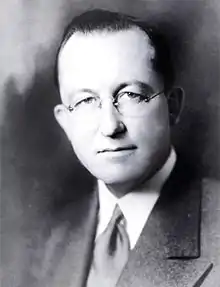James O. McKinsey
James Oscar McKinsey (June 4, 1889 – November 30, 1937) was an American accountant, management consultant, professor of accounting at the University of Chicago, and founder of McKinsey & Company.[2]
James Oscar McKinsey | |
|---|---|
 James O. McKinsey | |
| Born | June 4, 1889 |
| Died | November 30, 1937 (aged 48) |
| Citizenship | American |
| Alma mater | University of Chicago (MA) (BPhil) St Louis University (bookkeeping courses) University of Arkansas (LLB) Warrensburg Teachers College (BA) |
| Occupation | Accountant, professor, and management consultant |
| Employer | University of Chicago McKinsey & Company |
Notable credit(s) | Founder McKinsey & Company |
Biography
Youth, education and early career
McKinsey was born in 1889 in Gamma, Missouri, son of James Madison McKinsey and Mary Elizabeth (Logan) McKinsey.[3][4] After attending regular public school, McKinsey initially received training as a teacher[1] at the Warrensburg Teachers College, now University of Central Missouri, where in 1912 he obtained his Bachelor of Pedagogy.[2][5]
McKinsey continued to study law at the University of Arkansas, where he obtained his law degree one year later, in 1913. In 1914 he studied bookkeeping at the St. Louis University, and started his working career by teaching bookkeeping at St. Louis University.[2]
Next McKinsey entered the University of Chicago, where in 1917 he obtained his BPhil degree. After serving in the U.S. Army in World War I, he returned to the University of Chicago. There in 1919 he obtained his MA in commerce and passed the Certified Public Accountant (CPA) examination,[1][2] to act as certified public accountant in the State of Illinois.[5]
Further career
In 1917 McKinsey had joined the accounting faculty of the University of Chicago, and would continue to lecture there on and off until 1935. In 1926 he was promoted to full professor.[5] In the college year 1920-21 he had lectured accounting at Columbia University, and in 1921 had joined a private accounting practice.[1] In 1922 he published his first major work, entitled Budgetary Control.[2]
In 1926 McKinsey founded his own consultancy firm, McKinsey & Company, in Chicago, where he served as senior partner until 1935. In 1935 he accepted the appointment as chairman of the board at Marshall Field & Company, a department store in Chicago, and made Andrew Thomas Kearney managing partner of the Chicago office. In 1936 he was also elected chairman of the American Management Association.[2][1]
Flesher & Flesher explained that McKinsey "soon turned Marshall Field's red ink into profit, but he may have done so at the cost of his health. He died of pneumonia on November 30, 1937."[2]
Work
Management theory was still in its infancy when James O. McKinsey (or Mac, as he was known by friends and colleagues) founded the firm that bears his name in 1926. He had left his academic career to build a firm that provided finance and budgeting services but quickly gained a reputation for providing advice on organization and management issues.
McKinsey is credited with the first textbook on business budgeting, Budgetary Control, published in 1922, and the first textbook in management accounting Managerial Accounting, published in 1924.
McKinsey was determined to help senior management in American companies solve their most important business problems. In an era when "management engineers" were largely efficiency experts, McKinsey set out to enlarge the profession's scope by persuading clients that his young firm could not only help inefficient companies but also assist healthy companies in reorienting themselves to thrive in a turbulent business environment.
Selected publications
- Hodge, Albert Claire & James Oscar McKinsey, Principles of accounting, Chicago, Univ. of Chicago Press, 1920.
- McKinsey, J.O. Bookkeeping and Accounting, Volume 1. Cincinnati: South-Western, 1920.
- McKinsey, J.O. Bookkeeping and Accounting, Volume 2. Cincinnati: South-Western, 1920.
- McKinsey, James O. Budgetary control. New York: The Ronald Press, 1922.
- McKinsey, James Oscar. Managerial Accounting. Vol. 1. University of Chicago Press, 1924.
- McKinsey, James O. Business Administration. South-Western Publishing Co, Cincinnati, Ohio 1924.
References
- Morgen Witzel (ed), Encyclopedia of History of American Management, 2005. p. 362-3.
- Flesher, Dale L. and Tonya K. Flesher. "McKinsey, James O. (1889-1937)." In History of Accounting: An International Encyclopedia, edited by Michael Chatfield and Richard Vangermeersch. New York: Garland Publishing, 1996. pp. 410–411.
- Rita Perine Merritt, Leonard Bickwit (1925), The Accountants' Directory and Who's who. p. 576
- Allen G. Debus, World Who's Who in Science, Marquis Who's Who, Inc. 1968. p. 1148
- John J. Kahle. American Accountants and Their Contributions to Accounting Thought (RLE Accounting): 1900-1930. Routledge, 5 feb. 2014. p. 17
